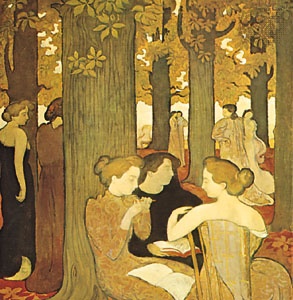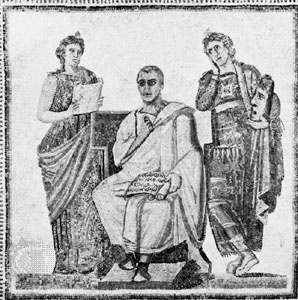Muse
Greek mythology
Greek Mousa, or Moisa, Latin Musa
 in Greco-Roman religion and mythology, any of a group of sister goddesses of obscure but ancient origin, the chief centre of whose cult was Mount Helicon in Boeotia, Greece. They were born in Pieria, at the foot of Mount Olympus. Very little is known of their cult, but they had a festival every four years at Thespiae, near Helicon, and a contest (Museia), presumably—or at least at first—in singing and playing. They probably were originally the patron goddesses of poets (who in early times were also musicians, providing their own accompaniments), although later their range was extended to include all liberal arts and sciences—hence, their connection with such institutions as the Museum (Alexandrian Museum) (Mouseion, seat of the Muses) at Alexandria, Egypt. There were nine Muses as early as Homer's Odyssey, and Homer invokes either a Muse or the Muses collectively from time to time. Probably, to begin with, the Muses were one of those vague collections of deities, undifferentiated within the group, which are characteristic of certain, probably early, strata of Greek religion.
in Greco-Roman religion and mythology, any of a group of sister goddesses of obscure but ancient origin, the chief centre of whose cult was Mount Helicon in Boeotia, Greece. They were born in Pieria, at the foot of Mount Olympus. Very little is known of their cult, but they had a festival every four years at Thespiae, near Helicon, and a contest (Museia), presumably—or at least at first—in singing and playing. They probably were originally the patron goddesses of poets (who in early times were also musicians, providing their own accompaniments), although later their range was extended to include all liberal arts and sciences—hence, their connection with such institutions as the Museum (Alexandrian Museum) (Mouseion, seat of the Muses) at Alexandria, Egypt. There were nine Muses as early as Homer's Odyssey, and Homer invokes either a Muse or the Muses collectively from time to time. Probably, to begin with, the Muses were one of those vague collections of deities, undifferentiated within the group, which are characteristic of certain, probably early, strata of Greek religion.Differentiation is a matter rather of mythological systematization than of cult and began with the 8th-century-BC poet Hesiod, who mentioned the names of Clio, Euterpe, Thalia, Melpomene, Terpsichore, Erato, Polymnia (Polyhymnia), Urania, and Calliope, who was their chief. Their father was Zeus, and their mother was Mnemosyne (“Memory”). Although Hesiod's list became canonical in later times, it was not the only one; at both Delphi and Sicyon there were but three Muses, one of whom in the latter place bore the fanciful name Polymatheia (“Much Learning”). All the Hesiodic names are significant; thus Clio is approximately the “Proclaimer,” Euterpe the “Well Pleasing,” Thalia the “Blooming,” or “Luxuriant,” Melpomene the “Songstress,” Erato the “Lovely,” Polymnia “She of the Many Hymns,” Urania the “Heavenly,” and Calliope “She of the Beautiful Voice.” Because dancing was a regular accompaniment of song, it is not remarkable that Hesiod called one of his nine “Delighting in the Dance,” Terpsichore.
The Muses are often spoken of as unmarried, but they are repeatedly referred to as the mothers of famous sons, such as Orpheus, Rhesus, Eumolpus, and others connected somehow either with poetry and song or with Thrace and its neighbourhood, or both. In other words, all their myths are secondary, attached for one reason or another to the original vague and nameless group. Hence there is no consistency in these minor tales—Terpsichore, for example, is named as the mother of several different men by various authors and Orpheus generally is called the son of Calliope but occasionally of Polymnia.
Statues of the Muses were a popular decoration in long galleries and similar places; naturally, sculptors did not make them all alike but gave each a different attribute, such as a lyre or scroll. This may have contributed to the fanciful distribution of individual Muses among the different arts and sciences, especially in Roman times. The lists that have come down are all late and disagree with one another. A common but by no means a definitive list is the following:
 Calliope: Muse of heroic or epic poetry (often holding a writing tablet).
Calliope: Muse of heroic or epic poetry (often holding a writing tablet).Clio: Muse of history (often holding a scroll).
Erato: Muse of lyric and love poetry (often playing a lyre).
Euterpe: Muse of music or flutes (often playing flutes).
Melpomene: Muse of tragedy (often holding a tragic mask).
Polymnia: Muse of sacred poetry or of the mimic art (often shown with a pensive look).
Terpsichore: Muse of dancing and choral song (often shown dancing and holding a lyre).
Thalia: Muse of comedy (often holding a comic mask).
Urania: Muse of astronomy (often holding a globe).
- Cavalcanti, Alberto
- Cavalcanti, Guido
- Cavalcaselle, Giovanni Battista
- cavalier
- Cavaliere D'Arpino
- Cavaliere, Emilio del
- Cavalieri, Bonaventura
- Cavalier, Jean
- Cavalier Parliament
- Cavalier poet
- Cavalla River
- Cavalli, Francesco
- Cavallini, Pietro
- Cavallotti, Felice
- cavalry
- Cavan
- cavatina
- cave
- caveat emptor
- cave bear
- cave deposit
- cave fish
- Cavell, Edith
- Cavendish
- Cavendish experiment